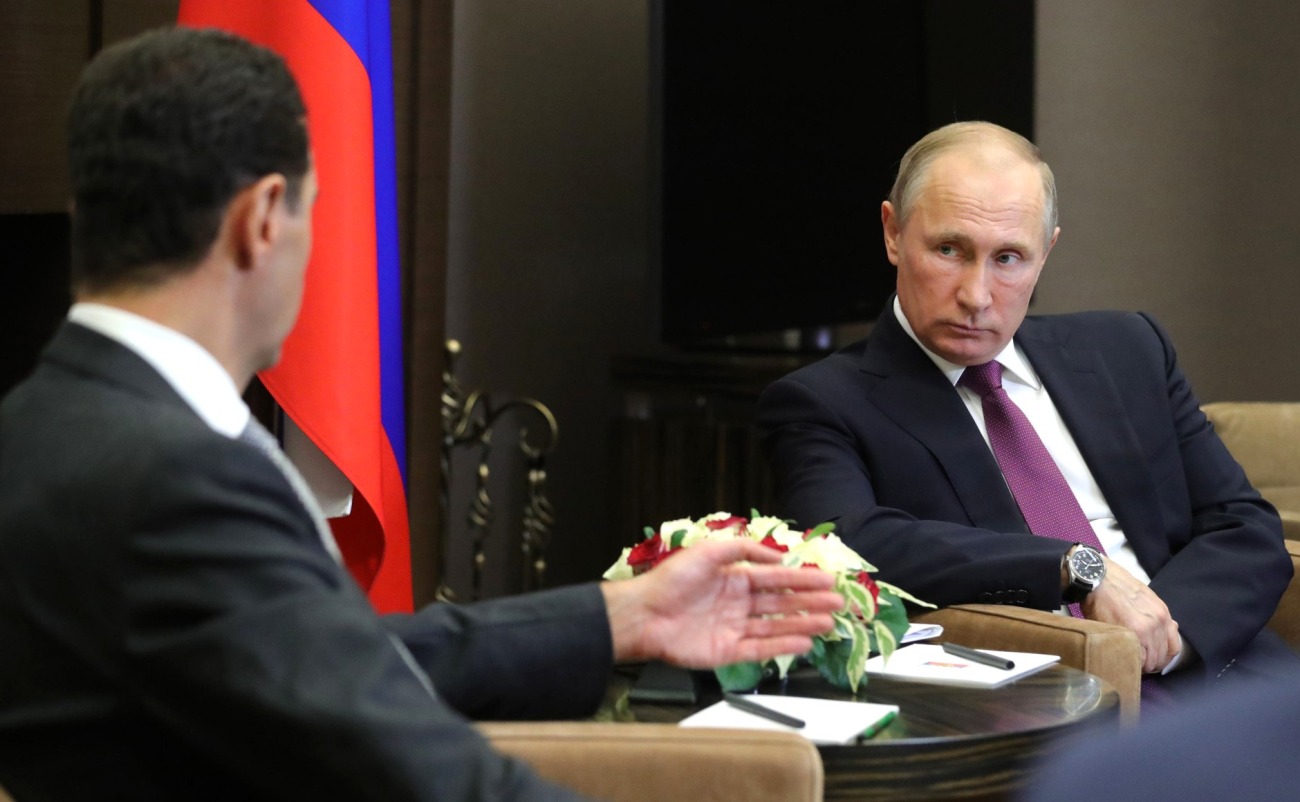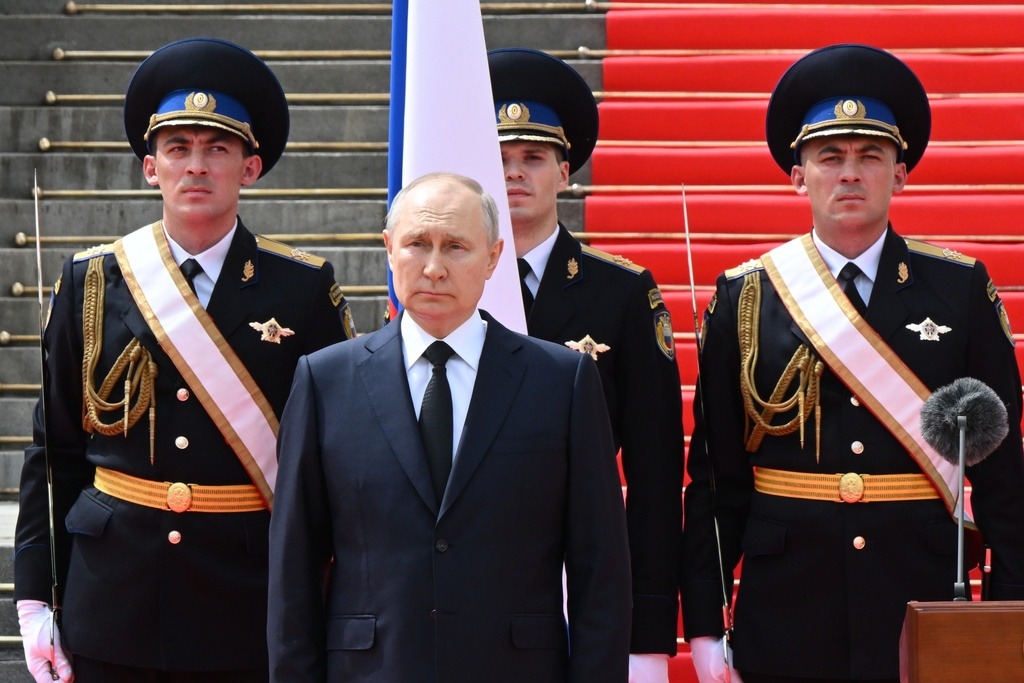There appears to be a global consensus among strategic elites that the overthrow of Assad would be a major shock to Iran and Russia. Syria’s strongmen, along with military support from neighboring Lebanon’s Hezbollah, were heavily dependent on Iran and Russia to topple Assad. Civil war broke out in the country in 2011.
The “pain” for Moscow may be even greater considering the fact that apart from military support for Bashar al-Assad, it was also providing diplomatic support to him in the region.
Indeed, thanks to Russia, the Arab League readmitted Syria last year after more than a decade of hiatus following the government’s brutal crackdown on anti-Assad protesters in 2011.
Has Russia lost its influence in Damascus now that Assad is gone? At first glance, it appears that way. But a closer look shows that Putin has left the ground open for Russia to control Russia’s core interests in Syria and the coalition led by rebel Hayat Tahrir al-Sham (HTS) leader Mohammad al-Jolani. is.
It will be noted that it was Russia’s military intervention in Syria in 2015 that changed the course of the civil war. A devastating air campaign by Moscow’s Sukhoi jets razed rebel-held cities, thereby tipping the scales in Assad’s favor.
The factors behind Russia’s intervention in Syria at the time are equally relevant today. Russia is said to have used its involvement to successfully “promote itself as a great power capable of challenging the United States, NATO, and the West in general, while expanding its global reach from the Mediterranean to Africa and Latin America.” are. It proved capable and willing to help allies and protect them from enemies.
In other words, it demonstrated Russia’s power in the region. Russia’s calculations turned out to be successful. President Putin has been able to maintain healthy relations with Sunni monarchies, especially in Saudi Arabia, the United Arab Emirates, and Qatar.
Indeed, Russia, traditionally an influential power in the Middle East and parts of North Africa, has enjoyed a geopolitical resurgence in the region after the collapse of the Soviet Union, thanks to a show of force in Syria. Russian trade, FDI, arms exports, and military deployments are currently gaining currency in the region.
So much so that in 2016, OPEC signed a declaration of cooperation with ten more countries, most importantly Russia. The agreement was seen as a temporary measure, but to date no document has committed non-OPEC countries to long-term cooperation.
Production management has also been carried out on a roughly six-month basis, but in reality, for the eight years since the agreement was signed, the group has operated with little distinction between OPEC member countries and non-OPEC member countries. In effect, Saudi Arabia and Russia have veto power in the talks.
In the process, Russia encouraged a number of Middle Eastern regimes to normalize relations with Syria, many of which disliked Assad’s ties to Iran.
Second, Assad gave Russia the much-needed warm-water port of Tartus in the Mediterranean and an air base near Latakia in return for Russia’s military and diplomatic support.
Incidentally, both were established during the Soviet era, when Syria was an ally of the Kremlin. President Assad agreed to a new “agreement” on these bases for Russian operations with a 50-year term. These agreements were of great strategic importance to Russia.
As a base, Tartus enabled Russia to conduct sustained surface and submarine operations in the Mediterranean and served as a conduit for operations into the Indian Ocean. It is even more important now that Russia’s Black Sea Fleet is under persistent Ukrainian drone attack. Additionally, the Tartus facility is Russia’s only Mediterranean repair and supply base.
If Con Coughlin, author of Assad: The Triumph of Tyranny, is to be believed, President Putin’s main motive for intervening in Syria in 2015 was to protect the two military bases mentioned above. Otherwise, Putin never liked Assad and “dismissed him as an incompetent fool.” His advisers persuaded him to intervene and save Assad to “protect” two military bases.
President Assad’s refusal to reconcile with Turkish President Tayyip Erdoğan or consider a political solution to end the civil war is likely to have heightened President Putin’s doubts about Assad’s ability to do so. It’s in
President Erdoğan has been keen to resettle in northern Syria the estimated 3.5 million Syrian refugees who have flowed into the country since the start of the civil war, because it would further undermine Kurdish efforts in the region. Because I want to. The failure of talks with Assad led Erdoğan to support rebel groups, especially HTS.
Moreover, Putin is said to be increasingly frustrated with Assad’s unwillingness to find some kind of accommodation with the rebels. Therefore, at an international conference held in Doha on December 7, Russian Foreign Minister Sergei Lavrov did nothing or said little to prevent the collapse of the Assad regime, and appeared to be withdrawing from the Assad regime. It looked like. On December 6, Russia recalled its troops and diplomats and began withdrawing from the base.

Indeed, Russian officials reportedly told Bloomberg News that the Russian government has no plans to rescue the Syrian president, and President Vladimir Putin has responded to reports that regime forces are fleeing their positions. It is said that he is hated.
“Russia has no plan to save Assad, and it is unlikely that one will emerge as long as the Syrian president’s forces continue to abandon their positions,” the Kremlin official said.
The Kremlin may also be taking notice of recent shifts in the Syrian opposition’s discourse. Jolani, a rebel leader who once had ties to fundamentalist groups such as al-Qaeda and ISIS, has now changed his views and supports a peaceful transition of power and a Syria where all religious sects can coexist peacefully. He said he is doing so. Therefore, President Putin has no compulsion to present President Assad to the world as an “unpleasant but acceptable (secular) status quo.”
Indeed, and this is very important to note, there are now reports that Syrian opposition leaders have agreed to guarantee the security of Russian military bases and diplomatic offices in Syria.
No wonder Russia’s Foreign Ministry said in a statement on Sunday morning, after rebels took control of the Syrian capital, that the two military facilities were on high alert but downplayed any immediate danger. “There is currently no serious threat to their security,” the ministry said in announcing Assad’s resignation and departure from Syria.
“As a result of negotiations between President Bashar al-Assad and numerous participants in the armed conflict on the territory of the Syrian Arab Republic, he has decided to resign from his position as president and leave the country, and has ordered a peaceful transfer.” He also said. Of power… We call on all parties to refrain from the use of violence and to resolve all governance issues through political means. In this regard, the Russian Federation is in contact with all groups of the Syrian opposition. ”
Kremlin spokesman Dmitry Peskov reiterated the same theme on Monday (December 9) regarding the future of Russian military bases in Syria. He said it would be a topic of discussion with the new rulers of Damascus, adding: “This is all a subject of discussion with those in power in Syria.”
Incidentally, U.S. President-elect Donald Trump, who claims to “know” President Putin, wrote in his Truth Social post, “Assad is gone. Assad is gone.” He fled the country. His protector, Russia, Russia, Russia, led by Vladimir Putin, was no longer interested in protecting him. There is no reason for Russia to be there in the first place. They lost all interest in Syria because of Ukraine, where nearly 600,000 Russian soldiers were injured or killed in a war that should never have started and could last forever. ”
It is a different matter that the Russian authorities have responded by denying the numbers of dead and injured that President Trump has mentioned. But his theory that Russia was weakened by its failure to protect Assad in the Ukraine war appeared to have many supporters.
And if this is true, Putin may have acted wisely by keeping lines of communication open with Syrian rebels and dissidents even before Assad’s overthrow.
President Trump may have ensured Assad and his family’s safety and security by granting them political asylum in Russia “on humanitarian grounds,” but President Trump has described Syria as “chaos”. Russia has done everything in its power to maintain its interests in Syria. The United States should not participate because “this is not our fight.”
Author and veteran journalist Prakash Nanda is the Editor-in-Chief of Eurasian Times and has been commenting on politics, foreign policy and strategic issues for nearly 30 years. He is a former National Fellow of the Indian Council of Historical Research and a recipient of the Seoul Peace Prize Scholarship. Number of Views Personal Author Contact: prakash.nanda (at) hotmail.com



